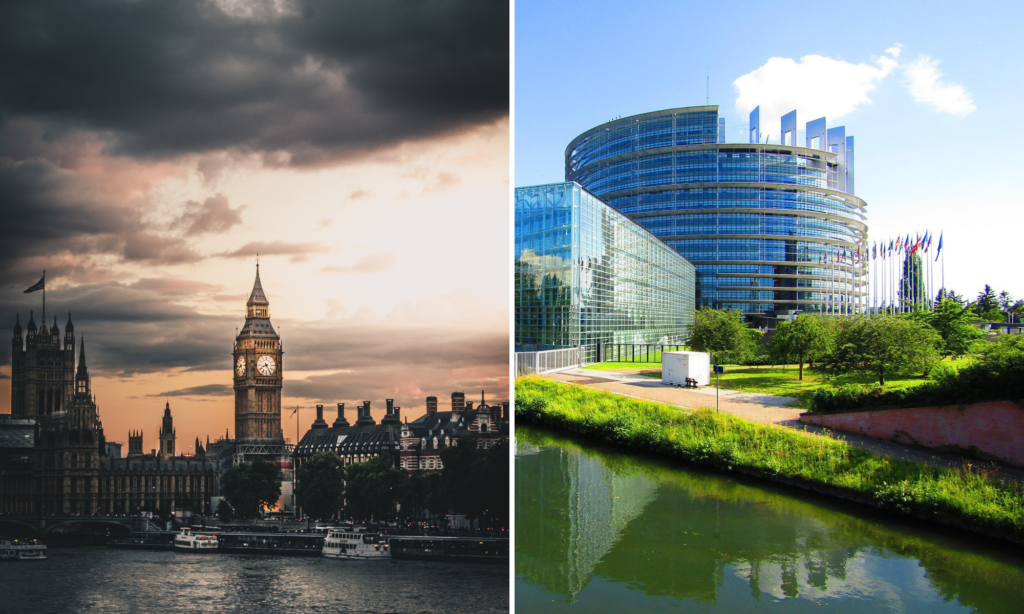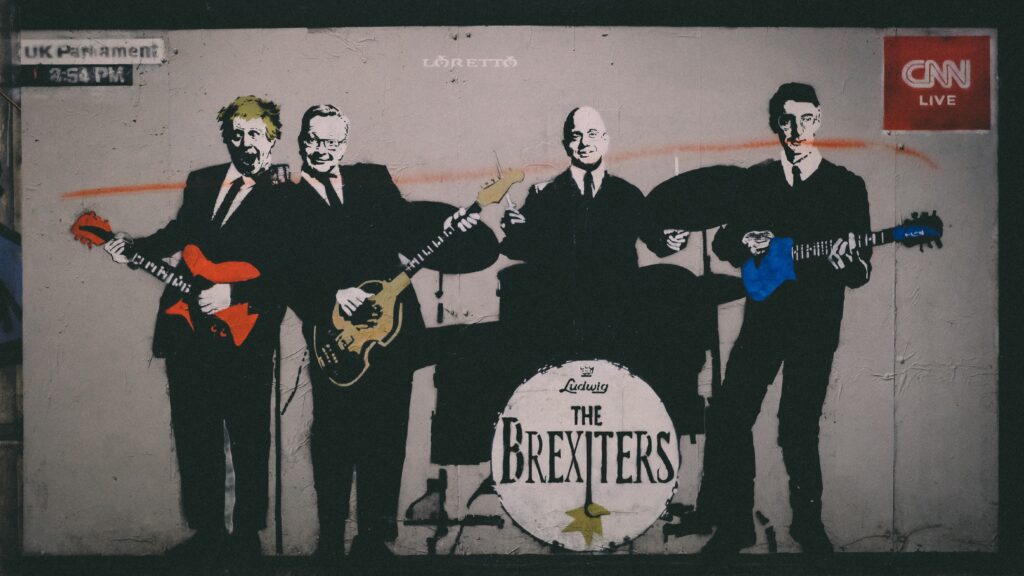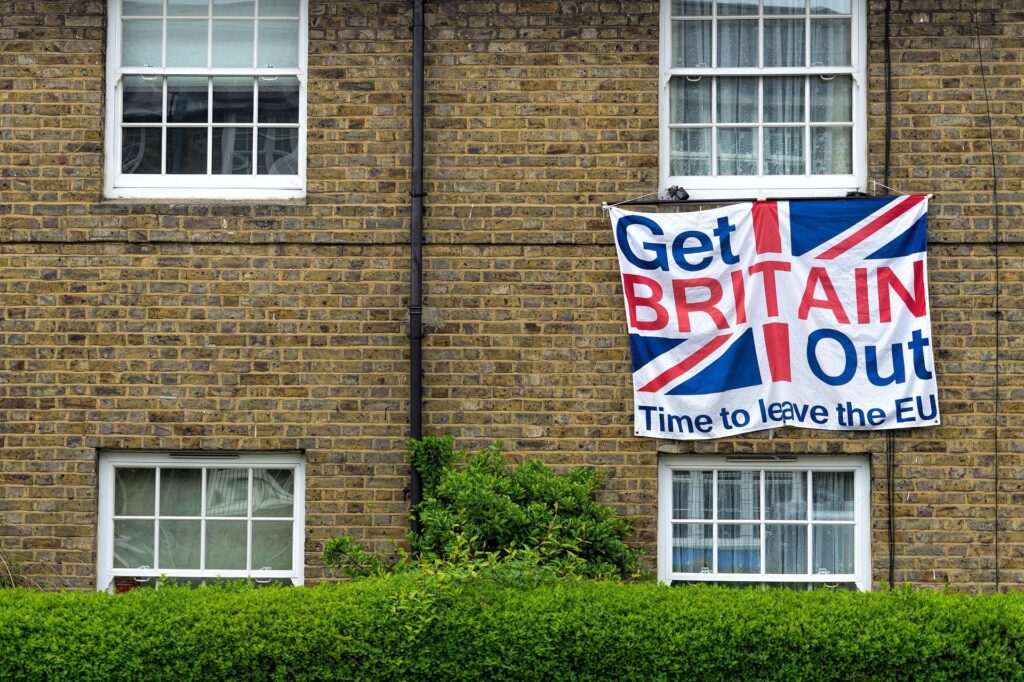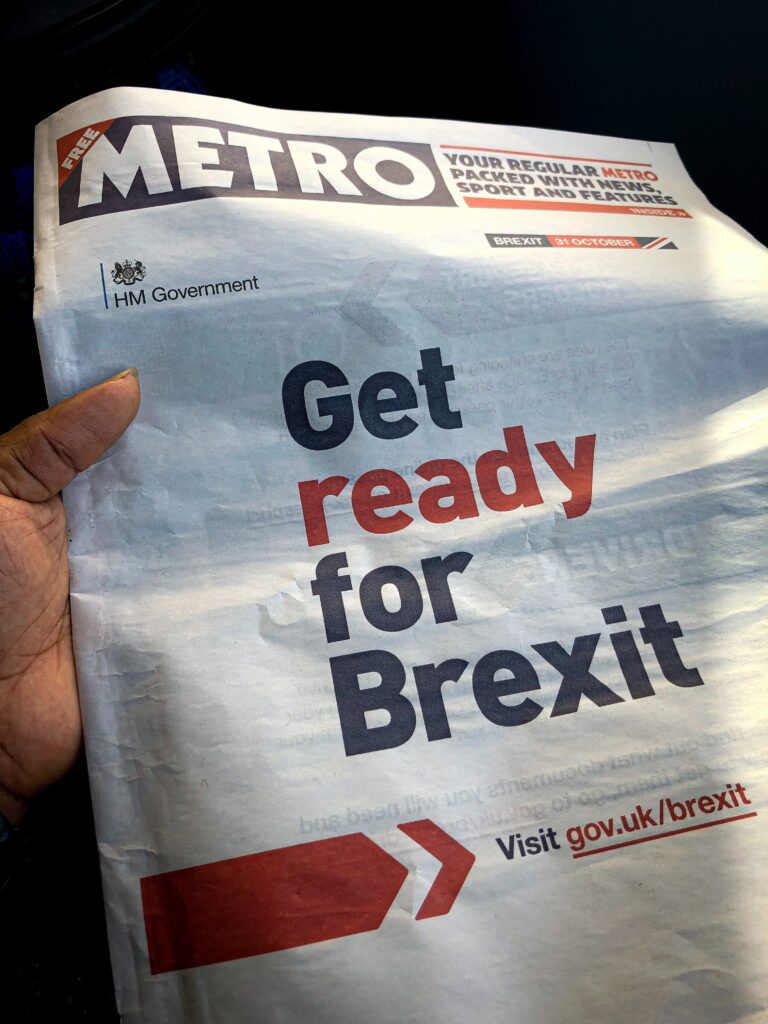By Adam Bennett
“We have, quite simply, a once-in-a-lifetime chance to take back control of our country.”
Boris Johnson, speaking in 2016
Six years ago, Boris Johnson was not the Prime Minister of the United Kingdom. His ambition to change that fact was an open secret, but any route to doing so would pit him against the incumbent, his then-friend David Cameron. For the previous eight years, Johnson had been building his profile as an affable, comical, and quintessentially British character whilst Mayor of London. Johnson’s good fortune ensured that the 2012 Olympic Games landed during his mayoralty, providing him with an opportunity to shoot to international prominence. By all accounts, Johnson’s political hero was Winston Churchill. But his carefully-curated public persona took more inspiration from Mr Bean.
When the time came for the 2015 General Election – with a referendum on Britain’s EU membership in his party’s manifesto – Johnson arranged his return to the House of Commons as an MP. From there, the world knew that he aimed to plot his move from MP to PM. And, just months later, he believed he saw that ‘once-in-a-lifetime’ opportunity to do so.
In the meantime, Cameron had become a leader addicted to trying his luck. In 2011 he had pulled the rug out from underneath his junior coalition partners, the Liberal Democrats, with a crushing win in a referendum on electoral reform. Three years later, he called the bluff of Scottish Nationalists by arranging, then winning, another referendum on Scottish independence. And then, in the 2015 general election, he performed perhaps his greatest magic trick by conjuring a Conservative majority against the forecast of virtually every poll and pundit. Having won so many bets in a row, Cameron had become a gambler who felt invincible.
Perhaps that was why the Conservative leader agreed to the demands of his right-wing backbenchers and legislated for a referendum on an idea he personally opposed: The notion of Britain leaving the European Union. But on this occasion, for the first, only, and last time, the Prime Minister had backed the wrong horse. By loosening the lock on the pro-Leave faction of his own party, David Cameron would open Pandora’s box. The forces he unleashed would go on to escape his control, revolutionise British politics, reshape the European Union, destroy his political career, and define his legacy.

In many ways, this story is one of personality, ego, and ambition. But it’s also the story of a crumbled empire yearning to redefine itself, locate its lost imperial swagger, and break free of codependency with its European neighbours. Above all else, this is the story of how Britain voted to ‘take back control’, and leave the European Union.
Part One: Coalitions of Chaos
By the time the Conservative party had committed to the 2016 referendum, it seemed as though Dominic Cummings might have left politics behind. In 2014, the special advisor had quit his post in the Department of Education and expressed a desire to set up his own free school. After having earned a reputation as one of Westminster’s most explosive, combative, and ingenious strategic minds, it looked as though Cummings was headed for a career of quiet achievement and peace.
Dominic Cummings and ‘quiet’, however, rarely walk hand-in-hand.
With the wheels of the EU referendum campaign grinding into gear, the controversial strategist was tempted back for one more job. For Cummings, the appeal of running the official Leave campaign was equal parts logical and visceral. Logical, because cutting ties with the bureaucracy of the EU fit neatly into his vision for a slimmed-down state. And visceral, because the civil service machinery against which he so bitterly fought whilst at the Department for Education was overwhelmingly pro-Remain. Brexit, then, was a chance for Cummings to hand the bloodiest of noses to the establishment he so reviled.
For the Leave campaign, landing Cummings felt like a coup. Not only was he tied closely with Michael Gove (a Conservative heavyweight whose Brexit allegiances were said to be wavering at the time), he also came with pedigree in winning referendums. The 2011 vote on electoral reform resulted in a landslide victory for the ‘No’ side, run by none other than Cummings himself. The relentlessly negative campaign against the proposed Alternative Vote system included pictures of babies on life support machines, with the copy:
“She needs a new cardiac facility, not an alternative voting system. Say no to spending £250 million on AV, the country can’t afford it”.
By hiring Cummings, the Leave campaign hoped to secure victory by tapping into similar messaging. This was glaringly reflected in the now-infamous slogan “we send £350m per week to the EU, let’s fund our NHS instead”, repeated frequently by Brexit campaigners throughout the referendum. Whatever the accuracy of that figure, there can be little doubt that the Leave side were simply leaning into a reliable tactic. In 2011, it was used to David Cameron’s benefit as his ‘No to AV’ side swept the board. Five years later, like Frankenstein’s Monster, it was turned against him to devastating effect.
Despite the slick campaigning strategies, however, there was more than a little chaos underpinning both sides of the EU debate. For Cummings’ Leave campaign, the anti-establishment nature of the Brexit cause resulted in a number of seemingly strange allegiances. Never before had pro-free market Conservatives such as Daniel Hannan and Andrea Leadsom lined up alongside figures on the anarchic left such as Clare Fox and George Galloway, as well as anti-immigration voices like Nigel Farage. In normal circumstances this ragtag band of campaigners would have agreed on virtually nothing, but the spectre of bureaucrats in Brussels was enough for them to set all other differences aside.

And yet, if anything, the Remain side was even more jumbled. Where else would a Conservative prime minister share a platform with the leader of the Green Party? All of Britain’s living prime ministers (current, former, Conservative, and Labour) were aligned on the pro-Remain side. They were joined by the centrist Liberal Democrats, and numerous voices from the left-wing Labour Party. Internally, the Remain campaign viewed this consensus across the established political parties as a strength. In reality, it only made the Leave campaign’s anti-establishment rhetoric hit harder.
In fact, the Brexit cause arguably united the Leave coalition far more tightly than the Remain side. Whilst pro-Leave rallies saw the likes of Galloway take to the stage with Farage, pro-EU leaders were far less inclined to bury the hatchet of day-to-day politics. Jeremy Corbyn, then-leader of the Labour Party, flatly refused to share a platform with Cameron, Green leader Caroline Lucas, and Liberal Democrat leader Tim Farron.
And as the campaign wore on, there was a growing sense that Cameron – the leading pro-Remain voice in British politics – didn’t really know who his voters were. For the first time in his political career, the Prime Minister was catering predominantly to young people and those on the left. The dissonance was highlighted during one particularly awkward Q&A where a young Remain supporter disavowed Cameron, shouting “you’ve fucked everything up!” at the prime minister.

George Osbourne, at the time Chancellor of the Exchequer and Cameron’s right-hand man, committed a symbolic blunder as the polls began to turn against Remain. In a high-profile speech, the man in charge of Britain’s finances fretfully warned that house prices would plummet in the event of a Leave victory. And yet, for young people concerned about getting onto the property ladder, there could hardly have been a greater incentive to let Brexit happen. Over time, increasingly implausible scare stories and muddled messaging became hallmarks of the Remain campaign. At one point, Cameron clumsily hinted that Brexit could trigger World War Three. By that point, credibility had largely drained away from both sides of an increasingly panicked and tense debate.
At the time the Brexit referendum was called, Britain was becoming ever-more rancorous and angry. But, as the campaign neared its end, a fraught and bitter national mood morphed into something far, far worse.
Part Two: No Turning Back
At times, and in spite of the heightened passions on display, the referendum campaign carried a comedic tone. On the 15th June, the pro-Remain singer Bob Geldof and the Brexit-supporting Nigel Farage engaged in a farcical shouting match aboard two flotillas on the river Thames. As Geldof flicked Vs at Farage with his fingers across the water, 60s pop music blared out from speakers to create a memorably bizarre spectacle.
But that tone swiftly curdled into something much darker. The next day, precisely one week before the vote, Labour MP Jo Cox was walking past Birstall Library in West Yorkshire. She was on her way to a regular meet-and-greet with constituents. But, tragically, she never arrived.
Thomas Mair, a 53-year old gardener, was convinced that the political left, liberals, and the mainstream media were at the heart of the world’s problems. His home, later inspected by police, was reported as being ‘stuffed with Nazi memorabilia’, and he had noted in his personal writings that ‘the white race’ was about to be ‘plunged into a long and bloody struggle’. For nearly seventeen years, a court later heard, Mair had fantasised about killing those who he saw as ‘collaborators’ – in other words, politicians and campaigners on the liberal left. On that day in June 2016, Mair lived out his sickening fantasy.
He shot Jo Cox twice in the head, and stabbed her fifteen times. An onlooking 77 year-old man, who intervened in an attempt to help Cox, was also stabbed. When Mair appeared in court for his trial, during which he made no attempt to defend himself, the killer chillingly gave his name as “death to traitors, freedom for Britain”. He was handed a full life sentence in prison, and will never be eligible for parole.
In a sign of the severity of the situation, and as a mark of respect, both sides of the referendum debate agreed to suspend campaigning. Jo Cox’s death was the first time a sitting MP had been murdered since Ian Gow in 1990, who was assassinated by the IRA.
Heartbreakingly, history would not wait long to repeat itself. In 2021, the Conservative MP David Amess was stabbed multiple times and murdered by the Islamic State sympathiser Ali Harbi Ali. Like Jo Cox, Amess was simply attending a regularly-held surgery in his constituency.
While the EU referendum still went ahead as scheduled, a threshold had been irreversibly crossed. Two months after Jo Cox’s murder, 25 MPs received identical death threats. The uncomfortable and inescapable truth was that Britain had become a country in which sitting politicians were murdered in the street. Perhaps more than trade deals and sovereignty, this frayed social fabric, toxic hatred of public figures, and frenzied tone of debate is the legacy the Brexit vote leaves behind.
Clearly no campaigner or strategist, on either side of the referendum debate, intended to contribute to such a state of affairs. But unintended consequences are consequences nonetheless.
David Cameron could not possibly have known that these events would unfold when he agreed to call the referendum campaign. But there is evidence that, somewhere at the back of his mind, he feared events spiralling out of control.
In Tim Shipman’s peerless All Out War, a superb and thorough account of the referendum, Cameron is quoted as listing the pros and cons of agreeing to a vote in the first place. “We could release demons of which ye do not yet know”, the Prime Minister expressed to an aide. What we may never know, is just whether Cameron would have agreed to the referendum had he known the true scale of those demons.
For some, it’s perhaps comfortable to believe that those demons were solely the invention of a tempestuous referendum campaign. But, in truth, there had been dark and unsavoury undercurrents in British politics long before the term ‘Brexit’ had ever been coined. An insidious intolerance had been festering beneath the surface, arguably the same caustic rejection of the political class which Nick Clegg and the Liberal Democrats had tapped into in 2010 via the shortlived ‘Cleggmania’. It had taken the Brexit campaign, however, for that poisonous hatred to fully burst into the mainstream.
In the years following the referendum, and after having resigned as an MP, David Cameron reflected on what could have been done differently. The result was “the greatest regret” of his career, he noted – but a vote on EU membership, whatever the consequences, was ultimately “inevitable”.
The uncomfortable reality for David Cameron is that he had been unable to keep certain skeletons inside Britain’s closet. But perhaps no Prime Minister and no government could have done that indefinitely. And perhaps rather than being the fault of one man – or one campaign – there is a sickness in British politics which runs much deeper. One under which the country continues to suffer today.
Part Three: The Revolution Begins

On the morning of the 24th June, Boris Johnson stood ashen-faced at a podium, flanked by an equally bewildered Michael Gove. As Johnson solemnly delivered the lines of his speech, onlookers would have been forgiven for thinking that the future prime minister had not correctly heard the result. Against the predictions of pundits and the forecasts of most polls, Johnson and Leave had won. By a margin of 51.89% to 48.11%, Britain was set to leave the EU.
“I want to pay tribute to my friend David Cameron”, remarked Johnson at the start of a pensive speech in which he would go on to caution against ‘haste’ in pursuing the result. In the following days, speculation grew over the reason behind the victorious Johnson’s dour demeanour.
“There have been a lot of reluctant Brexiters around, people who voted leave thinking it wouldn’t happen but they’d be able to vent and to tell all their friends at dinner parties they’d done it,” an unnamed Conservative minister is quoted as saying.
Whatever the truth might have been, there was no such hesitancy in the celebrations at Nigel Farage’s nearby victory party. In an astonishingly poorly-worded speech, the high-profile Brexiter hailed “a revolution … without a shot being fired”. With barely one week having passed since the shooting and assassination of Jo Cox, national press wasted no time in picking up Farage’s extraordinarily insensitive tone.
On the Remain side, the blame game had begun before the sun had risen. On the night of the referendum, Lib Dem leader Tim Farron railed against Jeremy Corbyn, accusing the Labour leader of “utter spinelessness” for having failed to inspire more of his voters to turn out for Remain.
Corbyn, for his part, took to the airwaves on the 24th of June to call for an immediate triggering of Article 50 (the legal process by which Britain would leave the European Union). That placed the Labour leader in the position of being keener to sever ties with Brussels than the official leave campaign – a point which led to much anger and resentment within his own party.
But at the centre of it all was the prime minister. “The British people have voted to leave the European Union, and their will must be respected”, Cameron said from outside the door of 10 Downing Street. It was his next words, however, which triggered chaos.
“I will do everything I can as Prime Minister to steady the ship over the coming weeks and months, but I do not think it would be right for me to try to be the captain that steers our country to its next destination”. With that, Cameron had brought an end to his leadership of the United Kingdom and underlined the closing of a chapter in British political history.
For years, politics in Britain had operated under a series of often-unspoken rules. One was that, when push came to shove, Brits – being a largely cautious people – tended to back the status quo. Another was a belief that, in close elections, the economy would be the issue which ultimately decided results. As of June 23rd 2016, these once-foundational rules no longer applied. Organisations such as the IMF and the OECD had made grand statements, warning that Brexit would damage the economy. They didn’t matter. Remain campaigners had consistently warned of the chaos and uncertainty of a post-Brexit world. That didn’t matter, either. Ahead of stability, a critical mass of Brits valued identity, sovereignty, and independence.
On the one hand, that can be read as a principled stand – an acknowledgement that some things are worth more than economic success. On the other, it can be seen as dangerous. A willingness to play games with geopolitics and prosperity, for the chance to roll the dice on a different future. Ultimately, it was a gamble which held significant allure. First for David Cameron, who staked his political career. He lost. And secondly for 52% of the British people, who were willing to stake so much more.
Much discussion, and much polling, since June 2016 has focused on the extent to which that 52% ‘regret’ their gamble. And yet, with Boris Johnson himself now in 10 Downing Street with a firm mandate to ‘get Brexit done’, that discussion is entirely academic. ‘Regret’, no matter how widespread or not, cannot change – can never change – what has been done.
Six years ago, a line was crossed. Britain’s past belongs to those who stare back, often longingly, over that line. But its future belongs to those who look beyond it.
While You’re Here…
Adam Bennett is the editor-in-chief of The International. You can find him on Twitter here.
